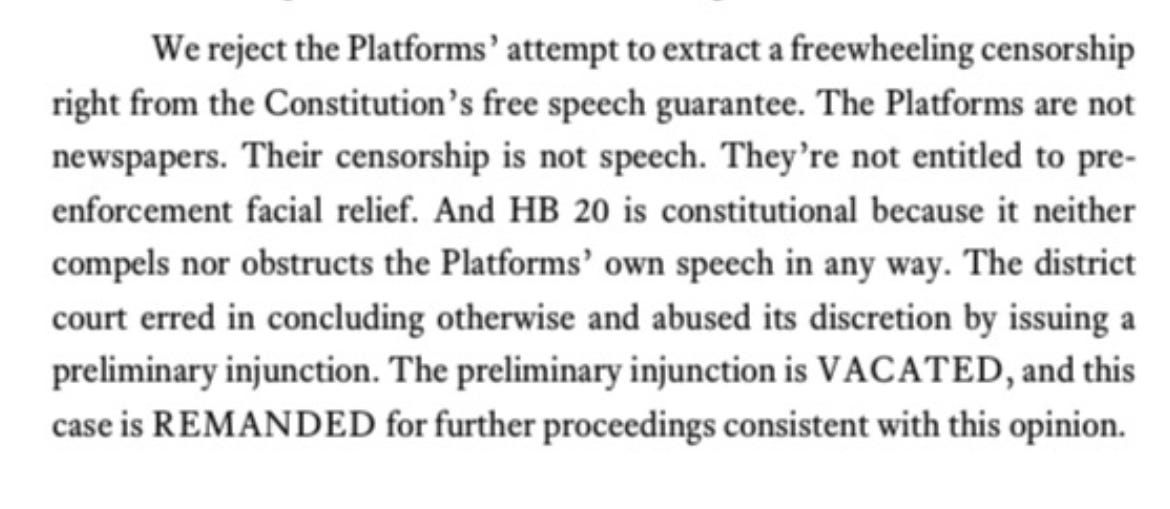A federal appellate court just blew up the absurd argument that the world’s largest carriers of speech and journalism can censor views they don’t like. Next stop, the Supreme Court
A federal appeals court just struck a massive victory for freedom of speech.
On Friday afternoon, in a brilliantly argued 90-page decision, the Fifth Circuit Court of Appeals ruled in favor of a Texas law stopping the biggest social media companies from censoring their users.
The ruling will likely be appealed to the Supreme Court, setting up a hugely important battle. If the high court confirms the Fifth Circuit’s view, companies like Twitter will mostly lose the power to censor their users for legal speech. If not, their censorship could become even more aggressive.
(A clarion call for free speech:)

—
Suppression of speech on Facebook and particularly Twitter was rare until the last three years. Now it is common – and mostly directed conservatives and people skeptical about Covid interventions and vaccines. (As you may have heard, I have some firsthand knowledge of the issue.)
The social media companies have successfully argued in other cases that their own First Amendment rights allow them to clamp down on users with opinions they don’t like.
In a little-known 2018 case, a lawyer for Twitter even told a judge in San Francisco that the company had the right to censor black people and other protected groups. “Does Twitter have the right to take somebody off its platform if it does so because it doesn’t like the fact that the person is a woman? Or gay?” Judge Harold E. Kahn asked a lawyer for the company on June 14, 2018.
“The First Amendment would give Twitter the right,” the lawyer said.
But Judges Andrew S. Oldham and Edith H. Jones rejected that view. They distinguished between the companies’ ability to say what they like, including commenting on users’ posts, and their right to censor.
The judges noted that the issue of discrimination based on political viewpoints is even larger than social media companies. The argument that social media giants have made could extend to other Internet companies and even banks:
Email providers, mobile phone companies, and banks could cancel the accounts of anyone who sends an email, makes a phone call, or spends money in support of a disfavored political party, candidate, or business.
The Fifth Circuit, which covers Texas, Louisiana, and Mississippi, is one of 13 federal appellate courts. Those courts are only one step below the Supreme Court. The importance of Friday’s ruling, along with the fact it runs counter to a ruling from a different federal appeals court in May, means it will likely be quickly appealed to the Supreme Court.
Indeed, the Judge Oldman, who wrote the primary 90-page decision, appears to have the high court in mind. His ruling drew on precedents as far back as 15th century English courts and built on five major Supreme Court cases on free speech and the First Amendment.
Oldham and Jones, who concurred with his opinion, are Republican appointees. But their decision can hardly be called partisan. The judges concluded that big social media platforms are more like “common carriers,” such as telephone companies that carry billions of calls, than traditional legacy media companies such as newspapers, which have limited space and choose all their content.
Twitter and the other social media companies have argued they are not common carriers and can’t be regulated that way because they censor, while traditional common carriers do not. The judges said that reasoning was circular and incorrect: “The Platforms [claim to] have a right to censor because they exercise editorial judgment, and they exercise editorial judgment because they censor.”
Under that logic, any existing common carrier could make itself exempt from non-discrimination laws simply by censoring users, the judges wrote. Further, just because social media companies are newer than other common carriers does not exempt them, since governments have a long history of extending carriage obligations as technology advances – “from ferries, to railroads, to telegraphy, to telephony, and so on.”
Whether the Supreme Court chooses to side with the Fifth Circuit remains to be seen, but no one can argue that the ruling doesn’t set out a clear case for forcing the biggest social media companies to carry speech without fear or favor.
Source – https://alexberenson.substack.com/p/twitter-and-facebook-and-youtube
